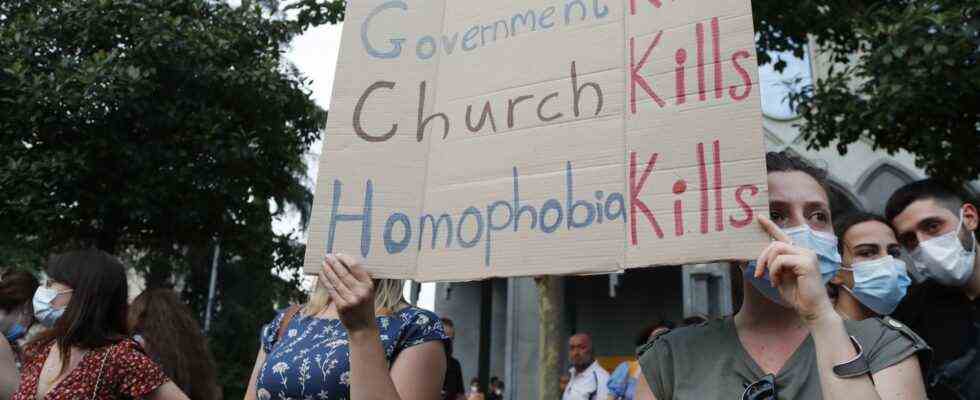analysis
Status: 07/13/2021 5:12 p.m.
Georgia’s path towards the EU is “irreversible,” says Prime Minister Garibashvili. Many Georgians want exactly that. But in the power struggle with the opposition, the people and democracy fall by the wayside.
From Silvia Stöber,
tagesschau.de
European flags have long been hanging in front of public buildings in Georgia, including the parliament in the capital Tbilisi. Officially, they stand for Georgia’s membership in the Council of Europe. But since the European flag with the twelve gold stars on a blue background looks like the EU flag, many see it as a symbol of hope that Georgia will one day become a member of the EU.
Polls show a stable majority in the population for this goal. But recent events raise questions: the European flag has disappeared twice in front of parliament. Violent demonstrators burned them while they were hunting journalists and LGBTQ activists. After the first time they put up a new flag at a demonstration against violence. After the second time, it was parliamentary speaker Kakha Kuchava from the ruling party “Georgian Dream” who hoisted a new European flag on the mast – just in time before EU enlargement commissioner Oliver Varhelyi arrived.
EU-friendly and anti-democratic
The ruling party is officially committed to implementing an association and free trade agreement signed with the EU in 2014. She wants to apply for membership in 2024. Georgia’s path to the EU is irreversible, said Prime Minister Irakli Garibashvili at his meeting with the EU enlargement commissioner.
At the same time, Garibashvili claimed that there was no discrimination against dissenting opinions or lifestyles in Georgia. All people are protected by law and the constitution.
But the prime minister contradicted himself. He practically denied the LGBTQ activists the right to Tbilisi Pride: 95 percent of the population did not approve of this, he said – the planned march was a provocation by the opposition to ex-President Mikhail Saakashvili. With his words, the prime minister spurred on the homophobic and ultra-right counter-demonstrators who marched through Tbilisi with priests of the Orthodox Church on July 5 and injured more than 50 people.
The injured cameraman Lekso Laschkarawa died on Sunday. Investigators immediately removed his body and rumored that he had died of drug abuse. Journalist Irakli Absandze was arrested for hours on Monday. He broke his arm in the process.
Preservation of power in covenant with the Church
The behavior of the prime minister makes it clear that the ruling party is not interested in values, but in maintaining power. Surveys not only show great support for the EU and NATO. The institution with the highest recognition has long been the Orthodox Church, which preaches an arch-conservative view of the family and is intolerant of ethnic and religious minorities. In their environment, ultra-right groups, media and parties cavort.
Obviously, Prime Minister Garibashvili is hoping for approval from the church before the local elections in the autumn. It is true that the “Georgian Dream” is already in its third term. But the election result was always weaker. There were allegations of manipulation in the parliamentary elections in autumn 2020.
The democratic institutions that were built with the help of the EU are believed by many to be weak. Many believe that the businessman Bidzina Ivanishvili makes important decisions – in 2012, with the “Georgian Dream”, he ensured that Saakashvili’s party “United National Movement” (UNM) was voted out of office and fights it almost obsessively.
Russian influence and nationalism
However, by portraying the ruling party as a Russian-led force, the UNM and others are making it too easy for themselves. They participated in the power struggle through boycotts as destructively as they did. The population is lagging behind with their worries: Above all, it is unemployment, poverty and debt, as surveys show.
Thus, apart from politics, a strong opposition movement formed. The reason for this are major projects such as the construction of hydropower plants, in which the residents see themselves as losers. For parts of the movement, homeland security and traditions are paramount. They spoke out against the Tbilisi Pride and thus sided with the far right.
While this broke with the urban environmental movement, there is heated debate over Russia’s influence. On the one hand, there are, for example, connections between right-wing extremists and the Russian Eurasianist Alexandr Dugin, but also with archconservatives in the USA. On the other hand, experts point to nationalist and traditionalist tendencies that exist in society regardless of Russia’s influence.
“Interference in internal affairs”
Instead of an open debate about Georgia’s development and direction, the government and the opposition polarize the population in the struggle for power – and then repeatedly ask the USA and the EU to mediate. As mediators, both are important political actors.
The ambassadors repeatedly take a stand, but in doing so they also get caught up in the power struggle and create opponents. This includes a group of powerful judges in Georgia, also known as the “clan”. When the EU criticized their influence on the filling of posts at the Supreme Court, the judges accused the EU of “meddling in internal affairs”.

